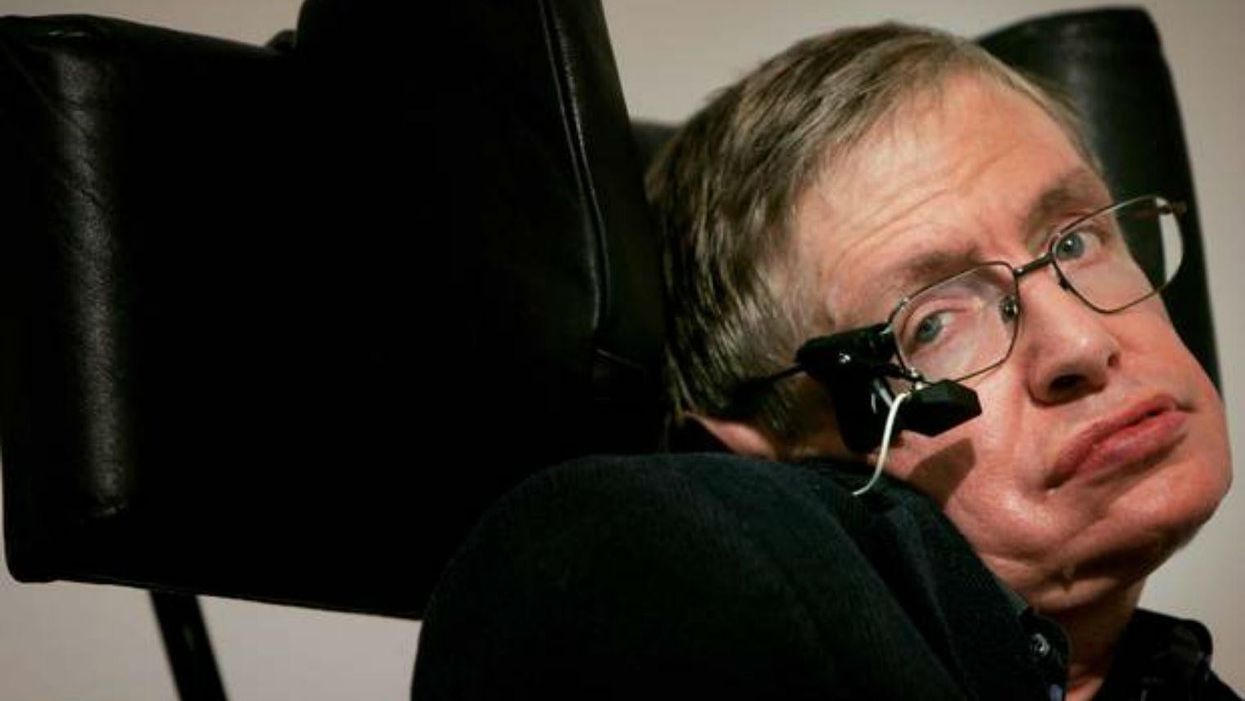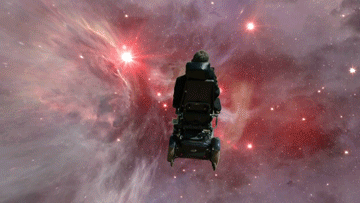Science & Tech
Andrew Griffin
Aug 26, 2015

Black holes are a passage to another universe, Stephen Hawking has said. But nobody’s really clear what that means.
The scientist made the claim as part of an exciting but complex new theory that looks to account for the “information paradox” — that the information about an object can’t be destroyed when it goes in a black hole, even if the object itself is destroyed.
But what does that mean? Members of Reddit’s Explain Like I’m Five forum have resorted to burning dictionaries and swimming in an attempt to clear up just what exactly Hawking meant.
User Iprocrastinetmrw had a fair crack at explaining — with reference to your over-eating friend Simon:
All right, let's say you have a friend named Simon, who's a normal weight and loves junk food, and a friend named Albert, who's extremely fat and also loves junk food. Since you're buddies with Simon, you'd be able to guess what junk food they're gonna eat next based on what they ate before and you'd also be able to guess what they had eaten based on the wrappers and boxes left over.
However, even though you're buddies with Fat Albert, he's just so huge that when he gets near enough something to eat, he swallows it wrapper and all. You have no idea what he'd eat next or what he ate before because he swallowed anything and everything near him. BUT NOW, all of a sudden, you realize that Albert is not only fat, but he's a messy eater. Because of this, you realize that there are crumbs, smudges, and pieces of the food left around his mouth. So you're like, OH! Now I know what you ate. Maybe in time you could use that to learn his eating habits just like you know your buddy Simon's!
So in this case, you're Mr Hawking, and you realized that the black hole, Albert, although he seemed not to leave evidence of food (information), actually might leave that evidence at the edge of his mouth (the event horizon = the edge of the black hole). You can use that to figure out all sorts of things!
Or the thing falling into the black hole could be thought of like a dictionary that has been cast into a fire, says user WusabiBobby:
Think a dictionary being thrown into a fire, the book is burned and the information is lost (except black holes don't burn things, they just disappear.) Now the theory is saying that it's more like throwing a dictionary into a wood chipper...it is no longer a book so technically it is gone, but the information is still there scattered among the tiny pieces of paper, making it incredibly unlikely to obtain any information from it.
Or perhaps swimming up a river makes it clearer, said user t_hab:
I think a decent analogy would be if you are trying to swim up a river whose current gets faster and faster the further downriver you swim. Your swimming speed is consistent and nothing can swim faster than you. Let's call your swimming speed "c." There is a certain point on this river where the current is exactly "c," your swimming speed. Anywhere upriver from there and you will be able to swim upriver against the current, but anywhere downriver from there you will lose to the current. Let's call that point the "event horizon."
Now you float down the river with a thousand of your clones with one clone starting to swim every second. Those clones who start to swim before reaching the event horizon make it upriver and those clones who start to swim after the event horizon get sucked downriver. The clone who starts to swim exactly on the event horizon will stay there forever.
Since "c" is the speed of light and it is a constant, anything that crosses that event horizon whilst emitting light, radiation, or any other form of information that travels at "c" would leave an shadow stuck on the event horizon.”
But the whole question relies on a concept almost as confusing as the proposal itself: that “information cannot be destroyed”.
User Cthulusuppe points out that “technically, there's no reason you can't destroy information, except that you can't."
If you could, cause and effect would cease to have logical certitude. Quantum determinism holds that given any initial state in which you have perfect information, you can determine any other state-- past, present or future. This is because the backbone of physics is cause and effect. If information is lost in black holes, you can never have perfect information in any universe that contains them, and therefore quantum determinism is false... which means the study of physics is deeply flawed at a fundamental level that cannot be fixed or worked around. And that kinda destroys our understanding of reality.”
But in practice, what does it mean that “information cannot be destroyed”? User chagajum had a go at explaining it:
Let's assume information is any signal that is binary in nature and holds its state. Your favorite team could either win(1) or lose (0) a game. Now you live a few miles from the stadium and need a radio broadcast to find out the result. Someone from the stadium broadcasts it but on the way to your radio receiver the signal is "destroyed" by some means. Let's assume some advanced contraption was used to destroy it.
Although we call the signal destroyed, the contraption that received the signal and "destroyed" it was exposed to the signal at least momentarily and thus knew the result if it wanted to.
Now we know, and knowing is half the battle (unless you fall into a black hole. Then you're probably screwed.)
More: 11 reasons to love Stephen Hawking (if you didn't already)
Top 100
The Conversation (0)














